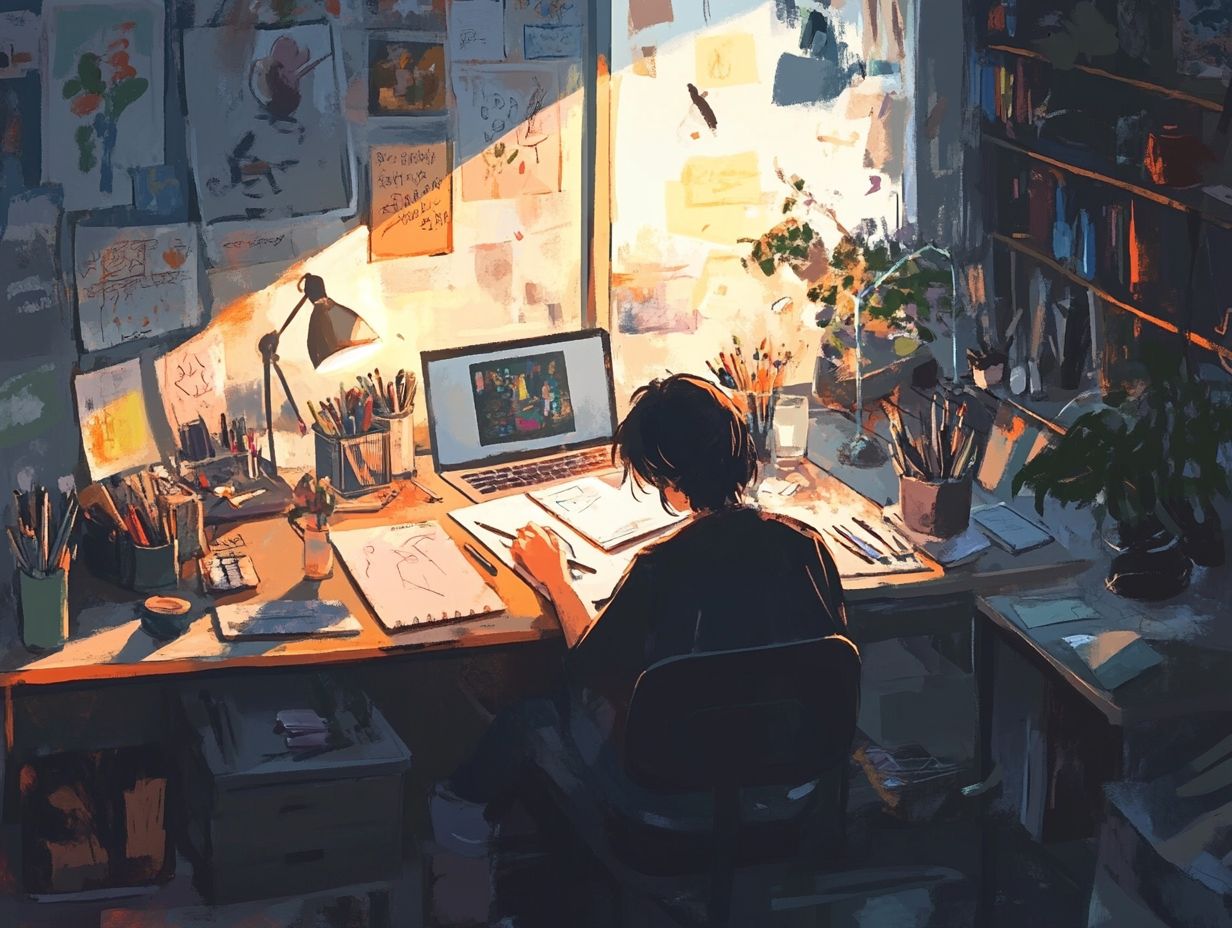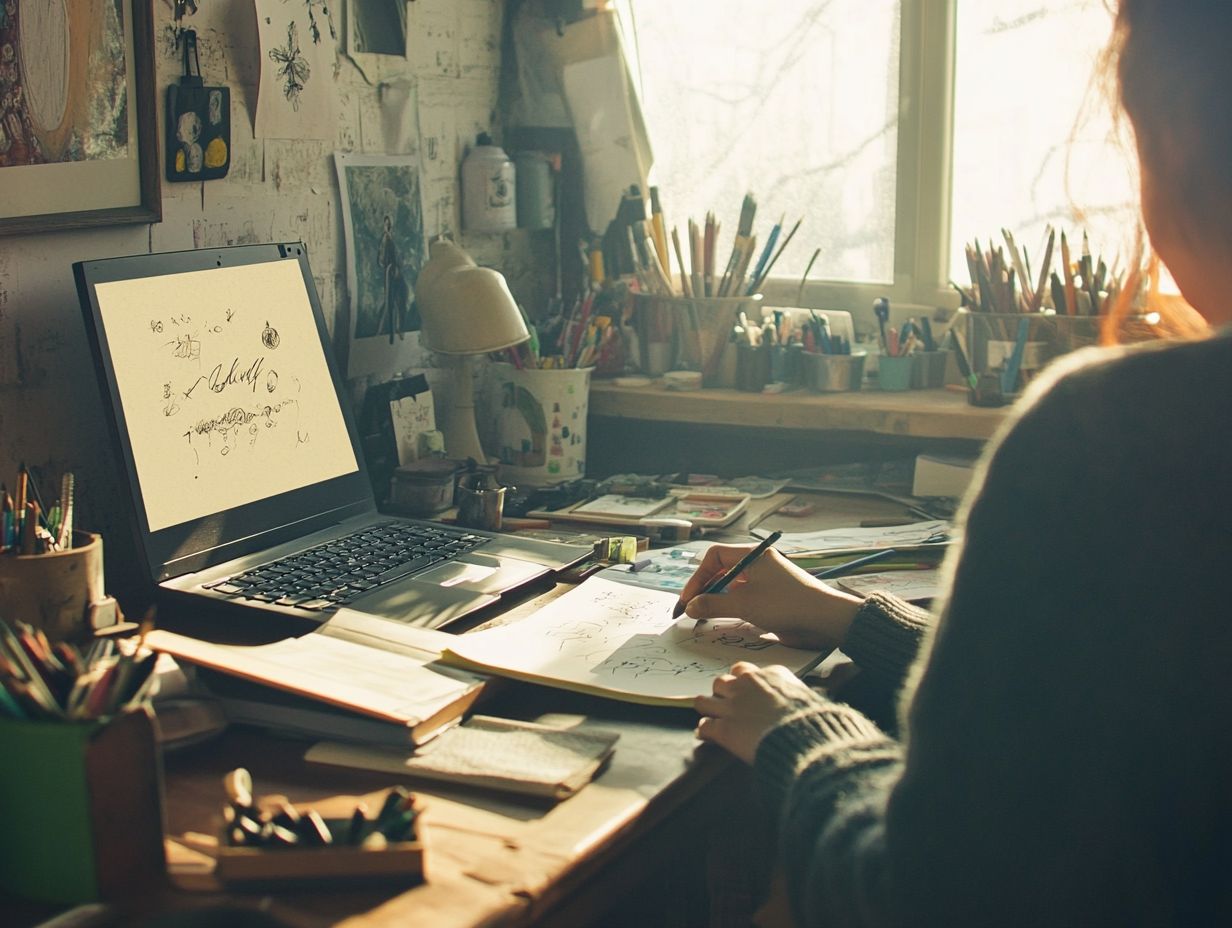How to Overcome Procrastination in Creative Projects
Procrastination can be a creative’s most formidable adversary, often stifling your innovation and productivity.
What compels you to delay tasks, and how can you effectively confront this ubiquitous challenge?
Let s explore the fascinating psychology of procrastination together. This article delves into its root causes and the detrimental effects it can exert on your creativity.
From practical strategies for breaking tasks into manageable pieces and establishing deadlines to tips for maintaining motivation, this guide equips you with the essential tools to conquer procrastination and flourish in your creative pursuits.
Whether you re grappling with perfectionism or simply in search of inspiration, this guide will empower you to reclaim your focus and unleash your full potential.
Contents
- Key Takeaways:
- The Psychology of Procrastination
- The Negative Effects of Procrastination
- Strategies for Overcoming Procrastination
- Tips for Staying Motivated in Creative Projects
- Dealing with Setbacks and Perfectionism
- Frequently Asked Questions
- 1. How can I stop procrastinating and start working on my creative projects?
- 2. What are some practical tips to help me overcome procrastination in my creative projects?
- 3. How can I stay motivated to work on my creative projects when I feel stuck?
- 4. What if I’m struggling with perfectionism and it’s causing me to procrastinate on my creative projects?
- 5. How can I create a more productive and focused workspace for my creative projects?
- 6. Is it okay to take breaks while working on a creative project, or will that lead to more procrastination?
Key Takeaways:

- Identify the root causes of procrastination to effectively overcome it in creative projects.
- Breaking down tasks and setting realistic deadlines are effective ways to stay motivated in your creative endeavors.
- Create a support system to help you overcome procrastination.
The Psychology of Procrastination
The psychology of procrastination explores the complex relationship between human behavior and your natural inclination to delay tasks. This tendency is often fueled by emotional discomfort and an unrelenting pursuit of perfection.
Such a phenomenon doesn’t just hinder your productivity; it can also stifle your creativity, especially in settings where accountability is absent. By grasping these psychological foundations, you can effectively tackle your procrastination habits and learn how to overcome procrastination with time management, developing a more constructive approach to achieving your goals while nurturing your mental well-being.
Understanding the Root Causes
Understanding the root causes of procrastination requires diving into the emotional discomfort that often accompanies your reluctance to engage in tasks. This discomfort is frequently tied to a lack of accountability in a free environment.
Such feelings often arise from underlying fears, particularly the fear of failure. This fear can leave you feeling paralyzed when it comes to starting or completing projects.
Perfectionism adds another layer to this struggle, as you may feel compelled to achieve flawless results before even taking the first step. Additionally, the allure of distractions especially from platforms like Netflix can complicate your procrastination tendencies even further.
Experts like John Perry highlight the importance of recognizing these causes, suggesting that creating structured environments can effectively combat inertia. Similarly, Joseph Ferrari emphasizes that understanding your emotional triggers is crucial for developing effective strategies to overcome procrastination.
By addressing your underlying fears, you can take actionable steps toward your goals with newfound clarity and purpose.
The Negative Effects of Procrastination
Procrastination doesn’t just derail your productivity; it also stifles your creativity. To combat this, using prioritization techniques for creative projects can help you stay focused. This creates a ripple effect of positive emotions that can enhance your overall success and personal achievement.
Embracing action instead can open the door to a more fulfilling life.
Impact on Creativity and Productivity
The impact of procrastination on your creativity and productivity can be profound, often leading to a fragmented creative process that hinders your ability to engage in deep work essential for success. Learning how to use visualization to overcome procrastination can help counteract these effects.
Being sidetracked by distractions makes it hard to maintain focus on your primary objectives. This habitual delay not only stifles your innovation but can also trap you in a cycle of anxiety and self-doubt, further diminishing your overall effectiveness.
To combat this, consider setting strict time blocks for focused work. Techniques like the Pomodoro Technique where you work in concentrated sprints followed by short breaks can help you sustain concentration and elevate your creativity.
Additionally, cultivating a dedicated workspace free from interruptions can significantly enhance your ability to immerse yourself in deep, meaningful work.
Start your journey to overcome procrastination today!
Strategies for Overcoming Procrastination

To overcome procrastination, you need to implement effective strategies that build good habits, manage distractions, and optimize your time budget. Learning how to turn procrastination into opportunity can lead to working on tasks before putting them off, allowing you to tackle your responsibilities proactively.
Breaking Down Tasks
Breaking down tasks is essential in overcoming procrastination. It helps you set manageable goals that lead to small victories and boost your motivation.
By segmenting larger projects into smaller, defined tasks, you create a clear roadmap that transforms daunting objectives into achievable milestones. This approach enhances your time management and encourages regular check-ins on your progress, which can be incredibly satisfying.
With this structured method, it s easier to prioritize tasks and allocate specific time slots for each one. As you complete each component, you’ll cultivate a sense of accomplishment that propels you forward. This incremental process supports a sustainable work-life balance, letting you enjoy breaks and leisure activities without the nagging guilt of unfinished work.
Setting Realistic Deadlines
Setting realistic deadlines is crucial in your battle against procrastination. This approach helps you maintain accountability and fosters a structured path toward achieving your goals within your time constraints.
By breaking larger tasks into smaller segments with specific timeframes, you create a roadmap that highlights your priorities while minimizing feelings of overwhelm. Try using the Pomodoro Technique: work for 25 minutes, then take a short break. For more insights, check out these practical tips for overcoming procrastination at work. This method keeps your motivation high and curbs the tendency to procrastinate.
Utilizing tools like digital calendars or project management apps can further streamline your process, allowing you to visually track your progress. These strategies help you feel accomplished as you meet your deadlines, reinforcing positive habits and significantly boosting your overall productivity.
Creating a Support System
Build a support system to reduce procrastination. Friends and family can provide the emotional backing you need to tackle tasks effectively.
A strong network can create an environment where you feel encouraged to pursue your goals. Sharing both your challenges and victories makes a difference in maintaining your motivation.
Accountability partners are essential; they offer gentle nudges during moments of discomfort, prompting you to confront tasks head-on. This partnership diminishes feelings of isolation and fortifies your resilience, helping you cultivate habits that pave the way for sustained personal growth.
Tips for Staying Motivated in Creative Projects
Maintaining motivation in your creative projects often requires a proactive strategy to combat procrastination. Learning how to turn procrastination into motivation is essential to address any emotional discomfort and to embrace the journey toward your goals, recognizing that each step is integral to your success.
Finding Inspiration

Finding inspiration is crucial for sustaining your motivation in creative projects. It enables you to navigate emotional discomfort and connect with the deeper meaning behind your work.
You may discover unexpected sources of inspiration in your everyday surroundings. It could be the soft, muted tones of a sunset or the vibrant energy of a bustling city street. Renowned painter Georgia O Keeffe once remarked, I found I could say things with color and shapes that I couldn t say any other way things I had no words for. This shows how nature and your surroundings can shape your creativity.
Think about what writer Maya Angelou said: You can t use up creativity. The more you use, the more you have. This serves as a powerful reminder that sharing ideas and experiences with others can lead to fresh insights, invigorating your artistic journey.
Rewarding Yourself
Rewarding yourself for reaching milestones in your creative projects can boost your motivation and help you overcome procrastination with self-care.
By rewarding yourself, you can create a positive feedback loop that inspires ongoing effort. For instance, treat yourself to a favorite snack or take a brief break to enjoy an episode of a beloved show as effective incentives. On a larger scale, rewarding yourself with a day off or a special outing can celebrate significant achievements.
This approach enhances productivity and fosters a healthier relationship with your work. It transforms tasks from burdensome obligations into meaningful steps toward your personal goals.
Dealing with Setbacks and Perfectionism
Navigating setbacks and grappling with perfectionism is an integral part of the creative journey. Changing your mindset can turn challenges into great opportunities for growth.
Managing Expectations
Managing your expectations is crucial when dealing with setbacks and perfectionism. It helps you align your goals with reality and fosters a healthier relationship with your creative pursuits.
When you set achievable and realistic expectations, you ll likely notice a decrease in emotional discomfort. This shift lessens feelings of inadequacy and nurtures a more compassionate view of your personal growth and achievements.
Take practical steps like breaking larger projects into smaller tasks. Celebrate incremental progress and embrace the learning curve. By redefining what success looks like, you ll find greater satisfaction in your efforts and build resilience to tackle challenges.
Learning from Mistakes
Learning from mistakes is essential for personal growth. It turns setbacks into invaluable lessons that pave the way for long-term success and the cultivation of productive habits.
By adopting a growth mindset, see challenges not as threats but as opportunities to sharpen your skills. This shift in perspective helps you accept failure as a vital part of the learning journey.
To build resilience, reflect on each mistake by pinpointing what went wrong and the underlying reasons. Keeping a journal is a powerful way to document these reflections and track your progress over time.
Engaging in conversations about failures with trusted friends or mentors offers insights and emotional support, reinforcing a positive approach to life s setbacks.
Frequently Asked Questions

Have questions? Don’t hesitate to reach out or explore further! Start applying these insights today to enhance your creative journey!
1. How can I stop procrastinating and start working on my creative projects?
To overcome procrastination, first identify its root cause. Are you afraid of failure? Feeling overwhelmed? Lacking motivation? Understanding the reason behind your procrastination allows you to find specific strategies to tackle it.
2. What are some practical tips to help me overcome procrastination in my creative projects?
Break your project into smaller, manageable tasks. This makes it feel less daunting and enables you to progress step by step. Set specific deadlines for each task to hold yourself accountable.
3. How can I stay motivated to work on my creative projects when I feel stuck?
When you feel stuck, look for sources of inspiration. Check out other people’s work, take a break to do something enjoyable, or talk to a friend about your project. A fresh perspective can reignite your motivation!
4. What if I’m struggling with perfectionism and it’s causing me to procrastinate on my creative projects?
Perfectionism is a major barrier in creative projects. Set realistic expectations for yourself and your project. Remember, perfection is impossible; embrace your mistakes! To further assist in overcoming procrastination, consider exploring how to overcome procrastination with minimalism. Focus on progress over perfection.
5. How can I create a more productive and focused workspace for my creative projects?
Transform your workspace to supercharge your creativity! Keep it clean and organized, free from distractions, and ensure all necessary materials are within reach. Add personal touches or decor to inspire creativity.
6. Is it okay to take breaks while working on a creative project, or will that lead to more procrastination?
Taking breaks is essential for maintaining productivity and avoiding burnout. Set a specific amount of time for your break and stick to it. This helps prevent your breaks from turning into prolonged periods of procrastination.






